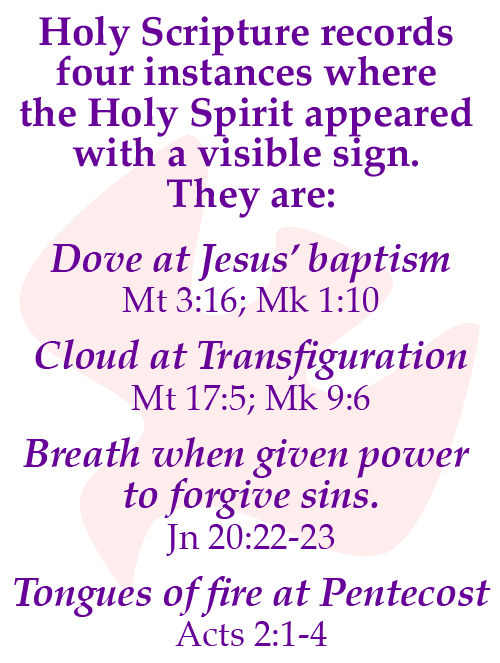MENU
CATHOLIC RENEWAL MINISTRIES
Dedicated to the renewal of the Church in the power of the Holy Spirit of our Lord Jesus Christ.
The Holy Spirit in the Catholic Church

Who is the Holy Spirit Is He Biblical Why Do We Need Him Obstacles to Receiving the Holy Spirit How Do We Get the Holy Spirit What Does The Magisterium say about the Holy Spirit |
Who is the Holy Spirit |
There
is much confusion concerning who the Holy Spirit is, why we need Him and
what the Church really says about Him. The following information has been
gleaned from orthodox Catholic teaching in the hope that we can better
understand His role in the Church and in our individual lives. The Holy Spirit is the Third Divine
Person of the Blessed Trinity who proceeds from the Father and the Son,
yet is equal to Them in every respect. To Him are attributed the works
of Love, regeneration, revelation and sanctification.
To believe in the Holy Spirit
is to profess that the Holy Spirit is one of the persons of the Blessed Trinity,
consubstantial with the Father and the Son (Catechism of the Catholic Church
Chap 3 # 685). The Holy Spirit is the Paraclete, the third Person of the
Holy Trinity. We refer to God the Father as Creator, God the Son as
Redeemer, and God the Holy Spirit as Sanctifier. He is called the Sanctifier
because the essence of sanctity is LOVE
and He is the personified love that exists mutually between the Father
and the Son. He is the Crossfire of love, if you will, between the Father and
the Son.
In the Old Testament, the Holy
Spirit meant a divine active power through whom God Himself is present in
man, the universe, history, and nature (Jb. 12:9-10;
Ps 104:30; Ex 37:9-14). In the New Testament, we read in John
17 Jesus' own words, "When the Spirit comes upon you, He will glorify
ME and that glory, which He will show, is the glory of My Father coming
through Me."
The Holy Spirit leads and guides
all (Acts 2:1-11; 13:2). He is called the
"Spirit of Grace" (Heb. 10:29).
He is the Holy Spirit and the Eternal Spirit (Heb.
2:4) and is referred to as the "Love of God personified".
He is equal to the Father and the Son from both of whom He proceeds. The
redemption of humanity through Jesus’ obedience to the Father’s plan, is completed by Christ sending the Holy
Spirit from the Father (Acts l:8).
As a Person, the Holy Spirit is
distinct from Divine Essence or the other Persons of the Blessed Trinity
(1 Cor. 2:10; 12:4). Through the Holy Spirit,
Christian life flows to men from the Trinity; through Him the love of God
enters our hearts and in Him all are baptized to make one body in Christ.
He dwells in us as in a temple, giving us life in Christ. Through Him we
know the deep things of God (Jn. 16:3; 1 Cor. 2:4-5).
The Holy Spirit, by His work,
gives life to the Church. He was sent as the necessary condition for the
founding of the Church, the One who is the Spirit of Truth and the One
leading toward truth (see Jn 16:5-15).
The Holy Spirit is the Third Divine
Person of the Blessed Trinity who proceeds from the Father and the Son,
yet is equal to Them in every respect. To Him are attributed the works
of Love, regeneration, revelation and sanctification.
To believe in the Holy Spirit
is to profess that the Holy Spirit is one of the persons of the Blessed Trinity,
consubstantial with the Father and the Son (Catechism of the Catholic Church
Chap 3 # 685). The Holy Spirit is the Paraclete, the third Person of the
Holy Trinity. We refer to God the Father as Creator, God the Son as
Redeemer, and God the Holy Spirit as Sanctifier. He is called the Sanctifier
because the essence of sanctity is LOVE
and He is the personified love that exists mutually between the Father
and the Son. He is the Crossfire of love, if you will, between the Father and
the Son.
In the Old Testament, the Holy
Spirit meant a divine active power through whom God Himself is present in
man, the universe, history, and nature (Jb. 12:9-10;
Ps 104:30; Ex 37:9-14). In the New Testament, we read in John
17 Jesus' own words, "When the Spirit comes upon you, He will glorify
ME and that glory, which He will show, is the glory of My Father coming
through Me."
The Holy Spirit leads and guides
all (Acts 2:1-11; 13:2). He is called the
"Spirit of Grace" (Heb. 10:29).
He is the Holy Spirit and the Eternal Spirit (Heb.
2:4) and is referred to as the "Love of God personified".
He is equal to the Father and the Son from both of whom He proceeds. The
redemption of humanity through Jesus’ obedience to the Father’s plan, is completed by Christ sending the Holy
Spirit from the Father (Acts l:8).
As a Person, the Holy Spirit is
distinct from Divine Essence or the other Persons of the Blessed Trinity
(1 Cor. 2:10; 12:4). Through the Holy Spirit,
Christian life flows to men from the Trinity; through Him the love of God
enters our hearts and in Him all are baptized to make one body in Christ.
He dwells in us as in a temple, giving us life in Christ. Through Him we
know the deep things of God (Jn. 16:3; 1 Cor. 2:4-5).
The Holy Spirit, by His work,
gives life to the Church. He was sent as the necessary condition for the
founding of the Church, the One who is the Spirit of Truth and the One
leading toward truth (see Jn 16:5-15).
| |
Is He Biblical | |
| Yes, Many scriptures point to the necessity of the Holy Spirit in the life of Christ's followers: i.e., Matt 3:13-17; Mk 1:9-11; and Lk 3:21-22. Also Rom 8:9, 15; Gal 4:6; 1 Cor12:13; 2 Cor 3, 17; 1 Pt 4:14; Jn 19:34; Acts 8:14-17. | |
Why Do We Need Him | |
| Because Jesus said so. When Jesus began His public ministry, the first thing He did was to be baptized by John the Baptist and He Himself received the Holy Spirit. Further recall the conversation between Jesus and Nicodemus as recorded in Jn 3:5, " Amen, Amen, I say to you, no one can enter the kingdom of God without being born of water and spirit." Because the Father sent Him as the necessary condition for the founding of the Church for He is the One Who is the Spirit of Truth and the Source of Holiness. Because in the economy of salvation, it is through the Holy Spirit, that Christian life flows to men from the Trinity, through Him the love of God enters our hearts, and in Him all are baptized to make one body in Christ. Because without the Spirit, we cannot achieve the fullness of life in Christ. Let us look to three scriptures to find out how Jesus Himself regarded the Holy Spirit. 1. Matt.3:13-17 "Then Jesus came from Galilee to John at the Jordan to be baptized by him. John tried to prevent him, saying, "I need to be baptized by you, and yet you are coming to me?" Jesus said to him in reply, "Allow it now, for thus it is fitting for us to fulfill all righteousness." Then he allowed him. After Jesus was baptized, he came up from the water and behold, the heavens were opened (for him), and he saw the Spirit of God descending like a dove (and) coming upon him. And a voice came from the heavens, saying, "This is my beloved Son, with whom I am well pleased." The Church sees the words,"for thus it is fitting for us to fulfill all righteousness" as the same as Jesus saying , " for thus it is fitting for us to submit to the plan of God for the salvation of man." 2. In Mark 1:9-11 we find, "It happened in those days that Jesus came from Nazareth of Galilee and was baptized in the Jordan by John. On coming up out of the water He saw the heavens being torn open and the Spirit, like a dove, descending upon Him. And a voice came from the Heavens, "You are My beloved Son, with You I am well pleased." 3. In Luke 3:21-22 we read, "After all the people had been baptized, and Jesus also had been baptized and was praying, heaven was opened and the Holy Spirit descended upon Him in bodily form like a dove. And a voice came from heaven, 'You are my beloved Son, with You I am well pleased'." At one and the same time, Jesus was baptized and filled with the Holy Spirit. The Church sees this as Jesus modeling what we need to do to live the Christian life effectively. | |
Obstacles to Receiving the Holy Spirit | |
The world at large does not receive the Holy Spirit because:
| |
How Do We Get the Holy Spirit | |
| 1. In order to receive the Holy Spirit, we have to take the initiative. How do we receive Him? Jesus answers this in Lk 11:13 "Ask the Father and He will send you the Spirit". 2. By receiving the sacraments of Baptism and Confirmation. In the reception of the sacrament of Baptism, the Holy Spirit is infused. Through our Confirmation, we are "sealed" and "strengthened through the action of the Holy Spirit". In Lk 24:9 Jesus tells His apostles prior to His ascending into Heaven, "And behold I am sending the promise of My Father upon you but stay in the city until you are clothed with power from on high." The promise He speaks of is THE HOLY SPIRIT and the power refers to the CHARISMS, WHICH ARE MANIFESTATIONS OF THE SPIRIT'S PRESENCE. They went to the upper room, waited and prayed for the nine days from the Ascension of Jesus to Pentecost. (Was this not where the Church gets our nine-day novena? How about seeing this as the very first Life in the Spirit Seminar?) We all know what happened at Pentecost--how the frightened, cowering apostles became courageous, bold evangelizers once the Holy Spirit came upon them and they were transformed into effective witnesses of Christ. 3. Opening ourselves up to all the Father wants to do in our lives and asking for the release of the Spirit. 4. By making a daily commitment to personal prayer. 5. Make a "Life in the Spirit" seminar or other renewal program. | |
What Does The Magisterium say about the Holy Spirit | |
Review
any of the 16 Vatican II documents. Also it is noteworthy that the Church
Fathers realized that at the beginning and at the end of Jesus' ministry,
the activity of the Holy Spirit was prominent in Jesus' and His apostles'
lives. Does it not indicate to us then, how important the Spirit is for
us in living out our baptismal call?
The Church relied on the Holy
Spirit as evidenced by the Book of Acts, which gives us much information
on how the early church was formed and spread. In
Acts 1:8, we find "But you will receive power when the Holy Spirit
comes upon you, and you will be my witnesses in Jerusalem, throughout Judea
and Samaria, and to the ends of the earth."
Additionally, St. Thomas Aquinas
tells us about the difference between "indwelling" and the "infilling"
presence of the Spirit. Upon reception of the sacraments of initiation, Baptism
and Confirmation, we have the Spirit residing within. That is the indwelling
"Know you not that you are the temple
of God and the Spirit of God dwells with you?" (1 Cor 3:16).
There is another dimension of
the Spirit's presence, which many people do not open up to and that's the
"infilling" of the Spirit. He is already present in us through
the sacraments. We should not view this as an empty glass being filled,
but perhaps the analogy would be the presence of a rose bud that opens
up to its fullest rose bloom. The Spirit released in our souls is an "infilling",
and we are given gifts called charisms with which to live the Christian
life by building up the body of Christ.
Vatican II teaches widely concerning
the Holy Spirit in the Church, the gifts of the Spirit, and the operations
of the Spirit through members of the Church. "Now, the gifts of the
Spirit are diverse. He calls some to give clear witness to the desire for
a heavenly home and to keep that desire green among the human family. He
summons others to dedicate themselves to the earthly service of men and
to make ready the material of the celestial realm by this ministry to theirs.
 Yet, He frees all of them so that by putting aside love of self and
bringing all earthly resources into the service of human life, they devote
themselves to that future when humanity itself will become an offering
accepted by God." (GS 38). As a point of interest we must note that
Vatican II 's 16 documents speak of the Holy Spirit in hundreds of places.
Finally as we look to the Vatican,
we find that the last three popes in particular were extremely mindful
of the Holy Spirit's role in the Church and in Christian life in general.
Pope John Paul II, in 1986 at
a Charismatic Retreat for 7,000 priests from 125 countries held in St.
Peters Basilica prayed for the Holy Spirit to renew the church. He told
the priests to go out and charismatisize the Church because there is so
much ignorance concerning the role of the Spirit and His gifts. He also
noted that there is such a great need for the Spirit and the charisms to
be activated in the church to prepare the people for the Second Coming
of Jesus, so they will be equipped to deal with all that is to take place
thereafter. Yet, He frees all of them so that by putting aside love of self and
bringing all earthly resources into the service of human life, they devote
themselves to that future when humanity itself will become an offering
accepted by God." (GS 38). As a point of interest we must note that
Vatican II 's 16 documents speak of the Holy Spirit in hundreds of places.
Finally as we look to the Vatican,
we find that the last three popes in particular were extremely mindful
of the Holy Spirit's role in the Church and in Christian life in general.
Pope John Paul II, in 1986 at
a Charismatic Retreat for 7,000 priests from 125 countries held in St.
Peters Basilica prayed for the Holy Spirit to renew the church. He told
the priests to go out and charismatisize the Church because there is so
much ignorance concerning the role of the Spirit and His gifts. He also
noted that there is such a great need for the Spirit and the charisms to
be activated in the church to prepare the people for the Second Coming
of Jesus, so they will be equipped to deal with all that is to take place
thereafter.
| |
| TOP |


